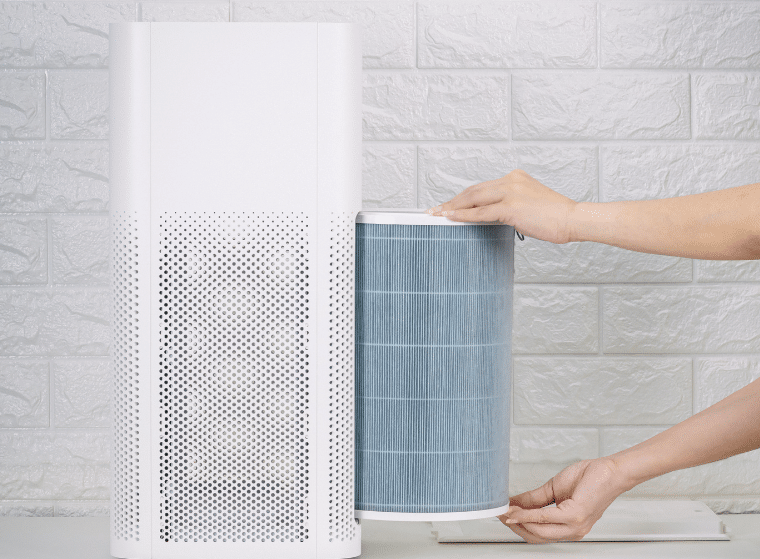Introduction
Indoor air quality is a major concern for homeowners, especially in humid climates. Many people invest in air purifiers to improve air quality, but do air purifiers help with humidity? While air purifiers are excellent for filtering airborne pollutants, their role in moisture control is often misunderstood. This article explores whether air purifiers can reduce humidity, how they compare to dehumidifiers, and the best solutions for maintaining ideal indoor air conditions.
Do Air Purifiers Reduce Humidity?
Understanding How Air Purifiers Work
Air purifiers are designed to remove airborne particles such as dust, pollen, pet dander, smoke, and bacteria. They use filters like HEPA (High-Efficiency Particulate Air) filters, activated carbon filters, and UV sterilization to clean the air. However, they do not absorb or extract moisture from the air.
Can Air Purifiers Control Moisture?
Since air purifiers only filter pollutants, they do not actively reduce humidity levels in a room. If you are struggling with high humidity, a dehumidifier is a more effective solution.
Air Purifiers vs. Dehumidifiers: Which One Do You Need?
| Feature | Air Purifier | Dehumidifier |
|---|---|---|
| Purpose | Cleans air by removing particles | Extracts excess moisture from the air |
| Does it reduce humidity? | No | Yes |
| Ideal for | Allergies, asthma, removing odors | Mold prevention, reducing dampness |
| Common technology | HEPA, activated carbon, UV | Refrigerant-based or desiccant systems |
The Role of Air Purifiers in Humid Environments
While air purifiers do not directly reduce humidity, they can still be beneficial in humid environments:
- Prevents mold growth: Air purifiers with HEPA and activated carbon filters help capture mold spores and prevent them from spreading.
- Eliminates musty odors: Humid environments can lead to stale, damp smells, which air purifiers can help neutralize.
- Reduces allergens: High humidity increases dust mites and airborne allergens, which air purifiers help remove.

How to Properly Control Indoor Humidity
1. Use a Dehumidifier
If your goal is to reduce humidity, a dehumidifier is the best option. It works by drawing excess moisture from the air and improving comfort levels.
2. Ventilation and Air Circulation
- Use exhaust fans in kitchens and bathrooms.
- Open windows and doors to allow fresh air circulation.
- Run ceiling fans to improve airflow.
3. Combine an Air Purifier and a Dehumidifier
For the best indoor air quality, pair an air purifier with a dehumidifier. This combination ensures clean, dry air, reducing allergens, mold risks, and respiratory issues.
Best Air Purifiers for Humid Climates
If you live in a humid area, consider an air purifier with additional features:
- HEPA filter: Captures airborne allergens.
- Activated carbon filter: Removes odors and VOCs (volatile organic compounds).
- UV sterilization: Helps kill bacteria and mold spores.
FAQs
1. Can air purifiers remove moisture from the air?
No, air purifiers do not have the capability to remove moisture from the air. A dehumidifier is required to lower humidity levels.
2. Will an air purifier make the air drier?
No, air purifiers do not affect humidity levels, so they won’t dry out the air.
3. Should I get an air purifier or a dehumidifier?
If you have allergy symptoms, dust, or pet dander, an air purifier is best. If you are dealing with high humidity, dampness, or mold, a dehumidifier is the better choice.
4. Can air purifiers help prevent mold in humid environments?
Yes, while they don’t remove humidity, air purifiers can filter mold spores and prevent them from spreading.
5. What is the best way to control humidity at home?
Use a combination of a dehumidifier, air purifier, proper ventilation, and air conditioning.
6. Do air purifiers help with condensation?
No, condensation is caused by high humidity levels, which require a dehumidifier or better ventilation to resolve.
Conclusion
While air purifiers do not directly reduce humidity, they are still valuable for improving indoor air quality. If you need to control humidity, investing in a dehumidifier is the best option. However, pairing an air purifier with a dehumidifier ensures cleaner, healthier air—perfect for those looking to reduce allergens, mold risks, and odors. By understanding the role of both devices, you can create a comfortable and healthy living environment.

